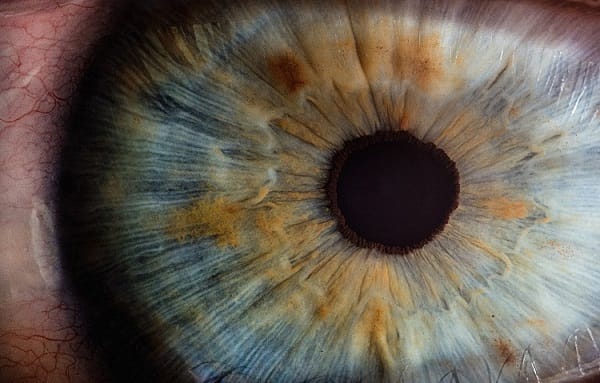Eye supplements: these vitamins sharpen your vision
Preserving your eyesight is an issue that is particularly important in old age. However, you can start much earlier and make a difference at a young age. Certain nutrients provide support for eyesight. So-called eye vitamins help to keep the eyes healthy. But which nutrients are important? And is a dietary supplement really worthwhile in this case?
Food supplements for the eyes – why they are so useful
People absorb important micronutrients through their diet. These include fatty acids, vitamins, trace elements, minerals and secondary plant substances. They are absolutely essential for our health and also have a positive effect on our eyesight. That’s why your diet should consist of plenty of fruit and vegetables. However, it is not always possible to provide the body with an adequate supply of all micronutrients. This is where dietary supplements come into play.
They start where the diet leaves off. However, if you eat a healthy diet, you should first check whether your body actually needs them. Overdosing is not advisable – it can even harm the body.
However, if the body lacks certain nutrients, this can manifest itself in the form of deficiency symptoms or even illness. Such consequences can occur during a diet. However, malnutrition, stress in everyday life or other causes can also result in the body not getting enough of the substances that are so important for it.
Dietary supplements for macular disease
Macular degeneration is a cause of gradual loss of vision . More precisely, vision in the area of sharpest vision is lost over time. This area is located in the centre of the retina. It is also known as the yellow spot or macula.
Dietary supplements can be particularly useful in the early stages of macular degeneration. Some use them in addition to therapy to improve the results.
Is it possible to counteract macular degeneration by taking dietary supplements? Various studies have not yet found any evidence that the disease can be prevented by an increased intake of micronutrients. Science has therefore not yet come to a clear conclusion. Nevertheless, a healthy diet is very important. Experts also advise against consuming too many stimulants such as nicotine. These are the most important prerequisites for protecting the sensory organ of the eye.
What should I bear in mind when buying food supplements?
Many people swear by dietary supplements. And rightly so: the products can compensate for deficiencies and have a positive effect on the body. Nevertheless, you should be a little careful if you want to buy food supplements for your eyes.
Not all dietary supplements are of high quality. It is best if supplements are made from natural substances. At Kingnature, you can obtain food supplements made from natural ingredients. They are manufactured directly in Switzerland – guaranteeing high quality.
These food supplements for the eyes are much better absorbed by the body. The ingredients are also available to the body more quickly.
Which food supplements are suitable for the eyes?
To ensure good eye health , some people take capsules with valuable ingredients. The so-called eye vitamins are particularly important. There are also other micronutrients that are worth taking.

Eye vitamins: From A to D
The retina and macular tissue are responsible for enabling people to see in the dark. To do this, they produce the substance rhodopsin – also known as visual purple. Vitamin A is particularly important for its formation. However, vitamin E and vitamin C also play an important role. These two vitamins are antioxidants. This means that vitamin E and vitamin C protect against oxidative stress and other negative influences.
Eye vitamins are said to slow down diseases of the macula and can prevent a vitamin deficiency. A deficiency can also reduce visual performance. Affected people see worse at night in particular. This is usually a clear indication of a vitamin A deficiency. However, dry and irritated eyes can also be the result of a vitamin deficiency. Then it is often B vitamins or vitamin D that are lacking. Vitamin B12 and B6 are particularly relevant.
Carotenoids
The so-called carotenoids provide protection against harmful UV radiation. These include lutein, beta carotene and zeaxanthin – ingredients that are also contained in most eye vitamin complexes.
In general, the group of carotenoids are naturally occurring coloured compounds. They give plants and animals a characteristic bright yellow to red colour. It is not without reason that beta carotene is a popular natural colouring agent.
The effect of carotenoids in the body is also not to be neglected. They can intercept free radicals and thus minimise their damage. Together with vitamins C and E as well as alpha-lipoic acid, polyphenols and certain enzymes, they form an antioxidant defence system.
Incidentally, lutein and zeaxanthin are 1000 times more concentrated in the macula and retina than in the blood, for example. This is why the macula has its yellow colour.
Omega-3 fatty acids
Omega-3 fatty acids are often recommended for dry eyes, light sensitivity, itching and redness. But what is behind this? Omega 3 is said to have an anti-inflammatory effect . The nutrient is also said to help keep the tear duct open better. This provides the eyes with more moisture. Omega-3 fatty acids are therefore important for sufficient tear production.
People who spend a lot of time working in front of a computer screen are particularly likely to benefit from appropriate dietary supplements. After all, this often dries out the eyes considerably. Anyone with eye problems should therefore either consume more omega-3 fatty acids through their diet or take tablets.
Minerals and trace elements
Eyes need zinc. This nutrient helps them to absorb vitamin A better. A lack of zinc can therefore be recognised, among other things, by the fact that it is extremely difficult to see at dusk or at night. A lack of the trace element may also be present if the eyes have difficulty adjusting to the change from a light to a dark environment. Zinc is also responsible for the healthy regeneration of sensory cells. In addition, the metabolism of the retina would not function without the nutrient.
Another relevant trace element is selenium. It influences a specific enzyme called glutathione peroxidase, which is particularly active in the lens of the eye . If there is a selenium deficiency, the enzyme can work less effectively. Cell damage is a possible consequence if the body has too little selenium.
Taking food supplements for the eyes: doing something good for your eyesight
If you are not getting enough nutrients from your diet, you should think about taking additional supplements. This can have a positive effect on your health and eyesight.
Nevertheless, it is advisable to look into any deficiencies before taking capsules and the like. A doctor can help you find the right dietary supplements for your body’s individual situation. After all, neither too high nor too low a dose of nutrients is advisable. This will keep the eye healthy and maintain vision into old age.


Conclusion
There are some dietary supplements that are very beneficial for the eyes. If you do not get enough vitamins and other nutrients from your diet, you can counteract this with supplements. Nevertheless, food supplements should always be seen as such: They are a supplement and do not replace a balanced and healthy diet.

